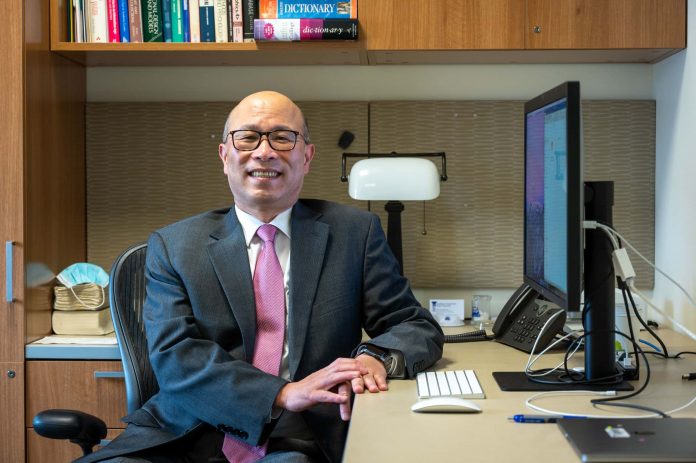In 2014, Dr. Hak Joon Kim turned down an invitation from his daughter, a then college student living in South America as a medical research team member, to visit Cusco, Peru. It was a lifetime opportunity for Kim, chairperson of the Department of Information and Library Science, but he had a legitimate reason for declining: just the year before, Southern’s Master of Library Science degree program had lost its ALA accreditation for the first time since it was granted in 1971. With the accreditation set to expire in 2015, Kim opted for missing the trip and bent to the task at hand — earning back full accreditation.
“We got our accreditation renewed continuously for over 40 years,” Kim says. “In 2013, we lost our accreditation, so our department had to redevelop the original master’s program.”
In a letter, the American Library Association (ALA) cited the major issues prompting it to withdraw its accreditation: student outcome was not evident and several full-time faculty members did not have publications to their name.
The ALA requires library and information studies programs to meet and report on five standards for accreditation every seven years: systematic planning; curriculum; faculty; students; and administration, finances, and resources.
To begin the accreditation process, Kim established an accreditation advisory committee that would offer input as the Department of Library Science overhauled its master’s program. Among the accreditation advisory committee were ILS faculty members, representatives from public and government libraries, SCSU librarians, and even a student from the SCSU chapter of ALA.
This rigorous planning culminated with the launch of the new Master of Library and Information Science degree program in 2016, built from the ground up. The difference between the former ILS and the new MLIS is the latter’s stronger emphasis on information, science, and technology. “The program went through the accreditation process all over again, which includes pre-candidacy, candidacy and full accreditation,” says Kim. “It was basically a six-year process.”
With 25 new courses added to the class roster, a format that is 100 percent online, and the only accredited program of its kind in Connecticut (and one of just three in New England), the MLIS witnessed a large influx of graduate applications this past admissions cycle.
“Just in headcount, our enrollment went up 50 percent,” Kim says. “But if we count in credit hours, enrollment increased 70 percent.”
Kim believes that potential candidates waited until the accreditation process was finalized to apply. It makes sense, for an ALA-accredited degree is required for most librarian positions in the United States.
Yet meticulous preparation, countless meetings, and thousands of pages’ worth of documentation are beginning to bear fruit. In May, Connecticut Library Consortium (CLC) awarded the MLIS Department and MLIS Advisory Committee the 2021 Jan Gluz Cooperative Spirit Award. The Jan Gluz award is given annually by the CLC to library leaders who embody the “can-do attitude and cooperative spirit” of Jaz Gluz, CLC’s late former bookkeeper/office manager for whom the award is named.
In an email, Jennifer Keohane, executive director of Connecticut Library Consortium, listed the redesigned and reimagined library education as well as the group effort and talent lent to overcome challenges and “make the library community in Connecticut stronger” as reasons for recognizing the SCSU MLIS Department and the MLIS Advisory Board with this honor.
Dr. Stephen J. Hegedus, dean of the College of Education, is proud of the achievement following seven years of hard work.
“This is the product of the shared commitment and diligence of the faculty and senior administration at Southern,” says Hegedus.
The recognitions do not stop here, however. In April, Kim himself became the recipient of the Special Achievement Award given by the Connecticut Library Association (CLA). CLA noted that Kim’s “nomination received many letters of support, highlighting the significance of [his] achievements in spearheading the reaccreditation” of the MLIS program.
In 2028, the MLIS Department will be required to submit another self-study to once again determine the eligibility of the program for accredited status.
“We will have to submit that self-study in seven years. The format is the same, but the content will be different because things change,” says Kim. “The faculty, students, and even culture change. We have to do it all over again.”


